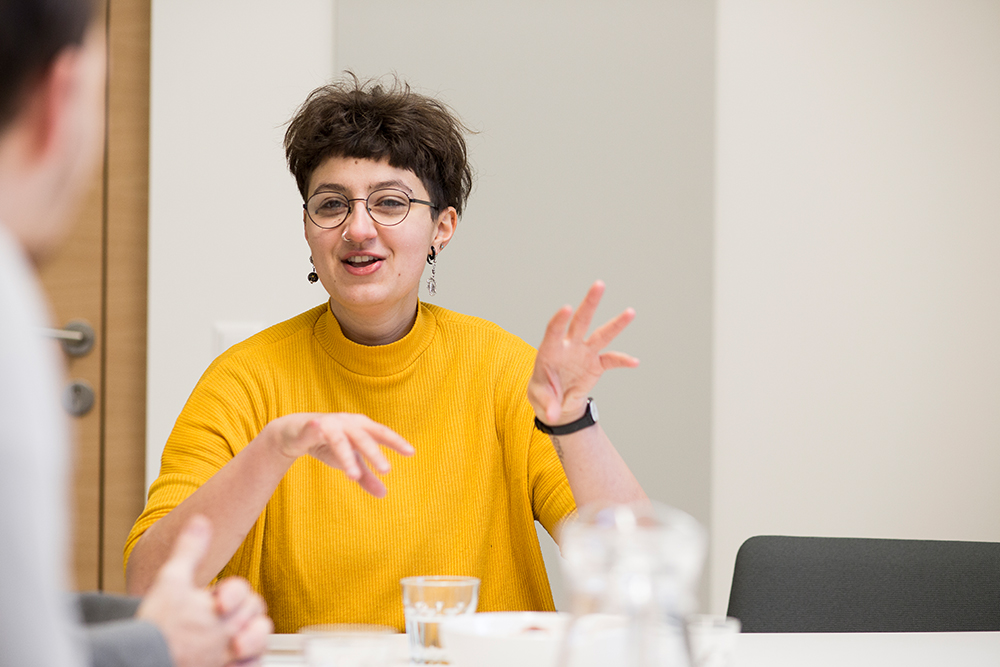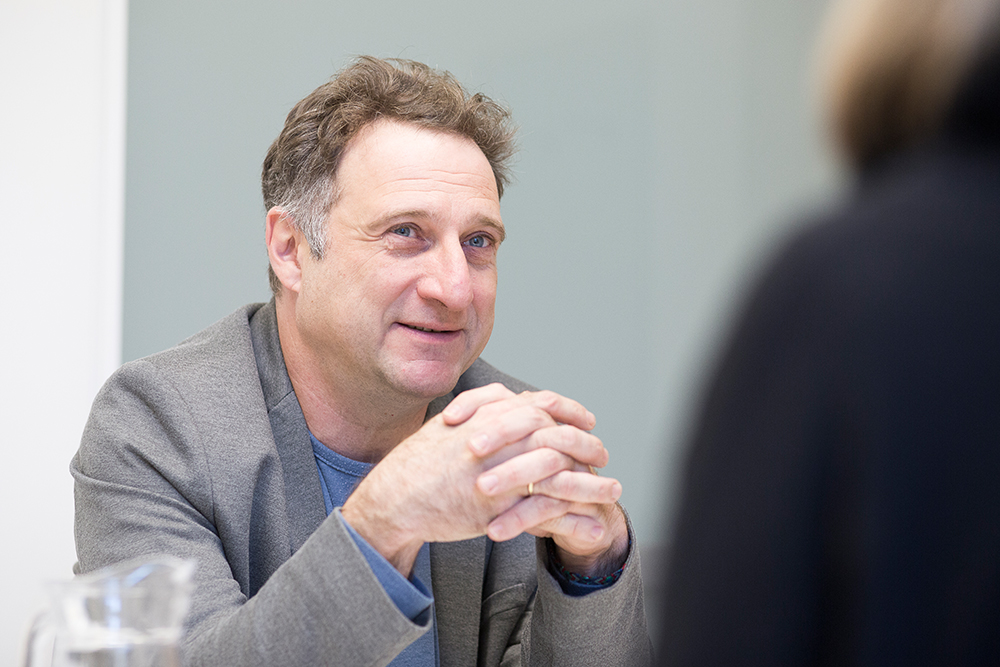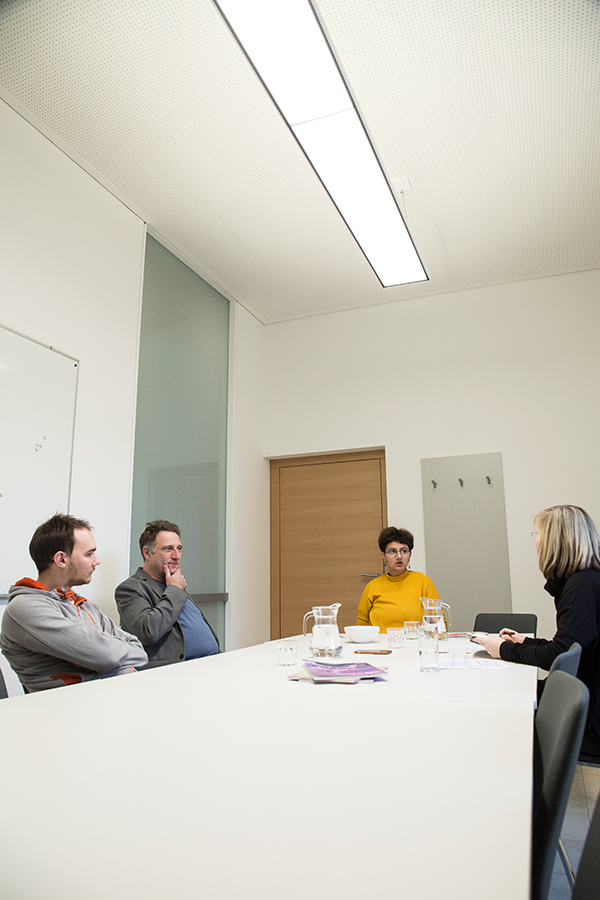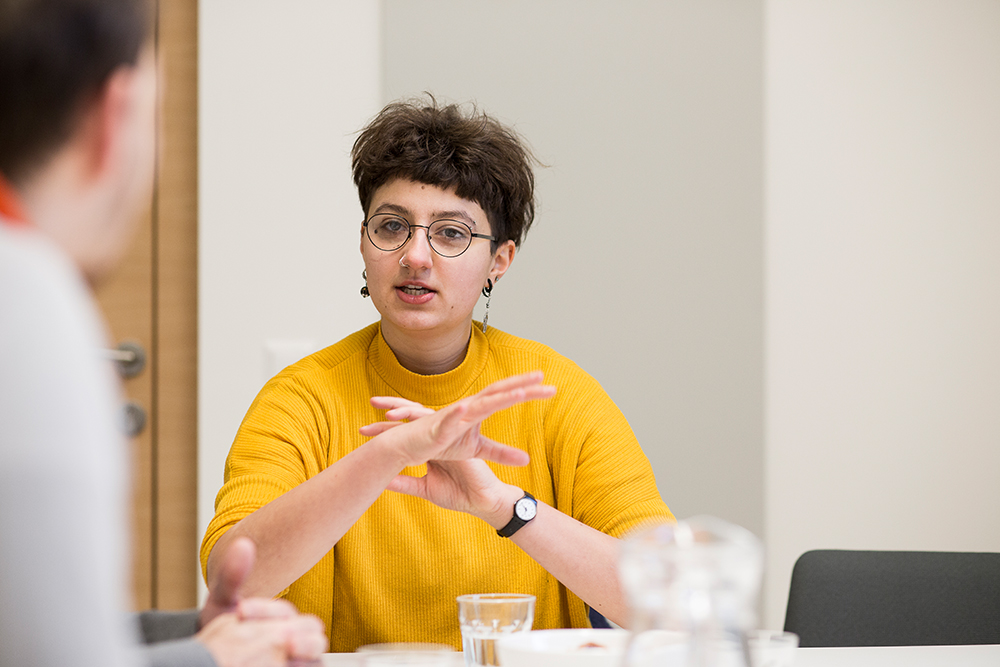All artists—no matter whether they work in theatre, film, literature, music, or elsewhere—are confronted with criticism, be it at a university, via feedback from teachers or students, in the form of audience reactions, or in (arts) reviews in the media. On the day that Austria’s new federal government was being inaugurated, mdw Magazine met with the young director, Nestroy Award winner, and Max Reinhardt Seminar graduate Felix Hafner; the author, 2017 Alpha Literaturpreis winner, and Film Academy Vienna student Marie Luise Lehner; and Stefan Mendl, an instructor at the mdw’s Joseph Haydn Department, co-founder of the Vienna Piano Trio, and two-time Echo Klassik Award winner, to talk about things like the significance of criticism for society, how they deal with criticism, and why audiences should have the confidence to be a bit more critical themselves.

Let’s start by talking about the classic notion of art criticism. The word “criticism” often has a somewhat negative ring to it. Why is this, what does criticism mean to you, and how important is it, really?
Marie Luise Lehner (ML): I always have a bit of a problem with people attaching negativity to criticism, because being critical is just so fundamentally human.
Felix Hafner (FH): I think that its negative connotations come from the fact that damning reviews are more fun to read—and maybe easier to write, too. We depend on reviews and we’re at reviewers’ mercy, but on the other hand, I think it’s just plain interesting to read what they write. A fairly large number of my colleagues say they don’t read any reviews, but I can’t honestly say I believe them. You’d have to have your blinders on pretty tight, I think, to read no reviews at all.
ML: And be totally full of yourself. The fact is that criticism can be extremely beneficial to one’s own work as an artist.
Stefan Mendl (SM): I don’t think that holds true for newspaper reviews. It seems to me that those are written mostly by people where I wouldn’t assume they’re competent enough for what they write to really be of any relevance to what I do artistically. But I’d never say that I don’t read any reviews—on the contrary, I always actively look to see if I find any. We performing artists and our agencies use them for promotion. But I am genuinely interested in criticism from colleagues or from people where it’s clear that they know what they’re talking about. And even though they may formulate it quite generously, I still take it to heart. But not what gets printed in the papers—that’s something I either use or throw out.
ML: If you do inspire a scathing review, at least you know you’ve struck a nerve. Getting someone to get sufficiently worked up over something you’ve done for them to trash you is an achievement in itself. And sometimes it can be for political reasons, which isn’t necessarily a bad thing, either.

FH: (laughing) Yeah, that’s true. That was the case with my most recent production at the Volkstheater (Nestroy’s Höllenangst—Ed.), when we got a nasty review from unzensuriert.at (a news platform with close ties to the far-right Austrian Freedom Party [FPÖ]—Ed.). That was really the most satisfying thing of all.
SM: Over the long history of art criticism, it’s also often quite amusing to see how the critics active at any given time have totally slammed works that we now recognise as towering masterpieces. While that was certainly quite painful for the artists, time has since proven just how wrong their critics were. All artists are sensitive, of course, and nobody’s normally overjoyed about a negative review. But you have to take it for what it is: if it’s positive, you use it, and if it’s negative, you toss it in the waste paper basket.
ML: You can even use it if it’s negative. I think that can sometimes be helpful, too.
FH: At any rate, I wouldn’t put all critics in the same box. For me, the distinction lies in how well they observe something. In their description of what I’ve done, in how well I can understand how they assessed and evaluated it. And that’s actually the thing that upsets me more often: when something you’ve done is given thoughtless or totally generalised treatment in the newspaper. On the other hand, a negative review that carefully picks things apart can often be very interesting and sometimes even helpful.
ML: In any case, it’s nice to have the feeling that someone’s given a text or a book by me a careful read and understood what it’s about, on the basis of which they can then offer criticism that’s positive or negative. As long as that’s so, which it is doesn’t really matter.

SM: What I really object to, because I think it has very little to do with actual criticism, are these quick scoring systems that are so popular now—like stars or whatever. You even run into it at the airport: after you go through the security checkpoint, you’re asked to evaluate whether your security check was good, mediocre, or bad. And when you go to the bathroom, they want you to rate the cleanliness with smileys—which I think is really idiotic. You see this more and more in reviews, too, even in daily papers. They’ll award five stars, three, two … or none … and I think that this kind of criticism is just simplistic, stupid, and senseless. If something’s actually meant as well-founded criticism, then it might as well also—as you implied—be a literary achievement in its own right.
ML: You really do see reviews that are just incredibly well written, which is something I value a lot. It isn’t at all common, and there are only a few such exceptional cases where you really see that someone didn’t just sit down and bang it out the evening before their deadline. And in such cases, when someone’s put several days into it, you really do notice. When someone reviews a novel, of course, then they have to have read it from front to back. And whether the person’s actually done so is something you can figure out almost immediately. A sure sign that they haven’t, which you often see, is when they’ve just reformulated the blurb on the dust jacket.
FH: One thing that’s interesting is how the Internet and its huge number of blogs have now made it possible for large numbers of people to criticise something and, with relative ease and speed, publish their material on Google-able platforms that one instantly associates with criticism.
ML: I actually think that’s extremely cool.

SM: Yes and no. It is extremely cool, but on the other hand, it’s dangerous because once something’s been posted, it never truly goes away.
ML: On the other hand, there are so many private opinions. There are book forums where people write about what they’re reading and what they think of it before they’re even done reading. And if you go to buy a book on Amazon, you’ll see 20 comments by random people who’ve just read it.
SM: Or in classical music videos on YouTube. The clips get commented on in a way that’s sometimes not that far removed from hate posts or flaming. Often about all kinds of completely absurd stuff… It’s sometimes funny how so many people put so much effort into that, but on the other hand, that’s the web—it gives everyone a forum, even for things that haven’t been properly thought through at all.
So you do follow it when reviews or other things expressing opinions on your work get published?
FH: I really do read everything. Including whatever I might find on social media. It’s this, in fact, that I find especially interesting—when audience members write something. Theatre is a field where’s you’re pretty dependent upon that. And especially in the Viennese theatre scene, it’s still the case that there’s a certain segment of the theatregoing public that decides whether or not to see a play based on what they read in the papers.
ML: I think that’s really true of all media. Before someone walks into a shop and buys a book, they have to have read a positive review—otherwise it just doesn’t happen. It’s rare for folks to just walk into a bookstore like Thalia and pick up something they see. When I got published, my book spent a couple of weeks close to Thalia’s main entrance as well as up on the first floor. But sales only actually took off once the first major reviews had come out.
SM: There used to be a lot more newspaper reviews of classical music, but now we have dedicated online platforms that review classical concerts and CDs. There’s now far more such material being published online than in the print media. Or at least it’s the case that people are far more likely to go to concerts and actually write something afterwards. That’s all getting more and more important. Whenever reviews of our concerts or recordings have come out in recent years, they’ve been mostly online—and only occasionally in the papers.
ML: I think things are a bit different for literature. Since literature’s audience is very fond of reading, they also read print media. So there are a whole lot of literary magazines—like manuskripte and kolik—and in those, they publish literature followed by reviews. It’s really quite a big thing.

Let’s return to the question of who’s writing those reviews. Johann Gottfried Herder once said, “If no art is possible without practice, then no complete, true judgment is possible without knowledge of this practice.” So what should a critic bring to the table?
ML: I think it’s extremely important that critics be given more time to deal with things. The factor of time is definitely a problem. Especially in television and radio, it’s been my experience that they’ve got very little time to produce a large amount of programming on a ton of different topics—so they don’t have any leeway at all to deal with something more closely. Of course, there’s also the difference that you can’t consume a book in just a couple hours like you can a play. But even so, the play still needs time to have its effect.
FH: Which sometimes doesn’t happen. There’s now even a trend towards writing online reviews during intermissions. So after the first act at the Burgtheater, you’ve already got someone working on a review. That’s something I just don’t get—because you can’t yet say anything if you’ve only seen half of a play. People actually do this, though…
ML: Exactly. And I’ve experienced cases where people didn’t actually had time to read the book, and it’s often been totally obvious. Like when I write a book about a father-daughter relationship and someone asks me something about childrearing. Or someone asks to what extent a text is autobiographic—which is simply the worst possible question you can ask where literature is concerned.
SM: I think that the music world is a bit different. In music, I expect the critic to have a certain amount of background knowledge. And that, despite this, they can still sit down with a certain measure of openness and in a certain way reflect how the audience experienced it and reacted. I think that critics do have to have a bit of an understanding of what they’re reviewing, and they should ideally also have some experience of their own, frequently attend concerts, and have a sense of how the audience receives something—because reporting on that is part of their job, too. After all, a review is partly a report about an event.
To what extent do economic considerations influence criticism, and could one even speak of “culture as a product”?
SM: 20 years ago, it wasn’t yet that way. Back then, things were released and got discussed. But now, when a new CD comes out, you receive immoral offers to buy articles in American CD magazines and stuff like that. Which is a truly disgusting development. Of course you get advertised when you play at a concert hall, of course they do press releases—that’s the kind of PR that’s done. But these days we’re at a point where that’s almost too little, because in our giant media ocean, you quickly disappear below the surface if you’re doing something that’s not some huge event.
ML: In my case, there are no events. Practically nobody goes to live readings. And nobody’s particularly interested in live readings, no matter where I do them. So live readings don’t have much of an effect. For me, appearances like that are far less important than something like winning an award.

Speaking of awards: all of you won awards during 2017. Do things like that actually help?
ML: The Alpha Literaturpreis benefitted me immensely because they have an extremely large PR department and put a lot of money into advertising it all. And because it’s an award that’s fairly new and beginning to attract more and more publicity.
SM: In terms of media interest, at least, Echo Klassik is very important. We were awarded one in 2010 and another in 2017. But as for really direct effects … that depends on what category we’re talking about. In 2010, the prize was for the best recording of chamber music from the second half of the 18th century—and as I said to my colleagues at the time, that’s like winning an Oscar for Best Costume. No one ever hears about it. Last year, then, we won the prize for Best Ensemble, which gets a bit more attention, of course. But ultimately … we didn’t even attend the awards gala. If you’re already a star, then its benefit will be all the greater. If you do chamber music, however, you can display your trophy and everyone will congratulate you—but it won’t have a huge effect on the gigs you get.
ML: For me, it was pretty much the case that I got to 4th place on the Austrian bestseller list the week after I won the Alpha Literaturpreis. That was extreme…
FH: My award didn’t do that much for me. Winning a Nestroy did draw quite a bit of media attention—and in my home village back in Styria, everyone now knows about it and has an idea of just what it is that I do. But the proverbial phone ringing off the hook didn’t materialise. I do believe that, long term, it’ll be a good thing to have won it. There was no real direct effect, though, not even on attendance figures.

Does that gets written in reviews influence what you do? After all: viewed historically, film criticism and theoretical work on film, for instance, have helped spur on film’s development.
SM: For me, I’d say categorically no. It’s a vehicle that makes me happy, amused, or angry, but it doesn’t influence me one bit. And I think that in music, it wasn’t all that different in earlier times, either. I don’t think that criticism significantly influenced music in its development; other things were at work, there. It’s events involving or affecting all of society that have repeatedly influenced classical music the most. Critics may have prevented or attempted to prevent certain things, but for the most part, whatever was truly good won out in the end.
ML: It’s so nice when you notice that someone’s understood something. When someone says, “This text is about…”—and I think to myself: “Yes!” (laughs)
SM: True, that is great. And it’s exactly like that in music, too—when someone says that this or that was especially touching and you have the feeling that it really was that way.
FH: It can also sometimes be really great in theatre: you discuss things with an ensemble over the course of a rehearsal phase or plan what you want to say about it or what the objectives are, and when you see that echoed in a review afterwards, it’s really affirming.
SM: Right, that’s the reverse. You get more or less get affirmed in what you’re doing. But have you ever really felt that you could integrate something from a review into your work as a productive suggestion?
FH: Not in an entirely direct way, but I do have my triggers. Pet themes of mine that I repeatedly come back to—when those appear in a review, my ears do perk up. But I would actually quite like to work on the fact that, leading up to a première, I give an excessive amount of thought to what might get written. I’m aware of how that’s totally senseless and really just blocks you, but the various pressures that exist in the theatre world sometimes make it impossible for me to keep it out of my head.
ML: The criticism that one quite naturally prefers, and that can be most helpful, is the criticism that one solicits from colleagues. And I solicit it from people whom I value and of whose output I think highly—I go to them and give them a text. The feedback I get from them is far more detailed and extensive, and it sometimes actually turns into a dialogue where I can also ask certain things. That’s the kind of criticism I’m always very eager to get, the kind that’s extremely valuable and stimulating.
SM: That’s like how it is in my teaching work. I get students coming to me who are usually extremely motivated and out to do something really good, and what they want from me is criticism. They want someone to critique what they do in such a way that it enables them to improve. And that’s really an extremely important form of criticism—one where you don’t trash anyone but really try to use it to make everyone that much better. And sometimes, afterwards, it really is a bit better—or even fantastic. When you’re the one asking for such a critique, you open yourself up to a person where you can assume they’ve been doing what they do for a long time, have lots of experience, and won’t tell you just anything.
What’s been your basic experience with criticism-as-feedback in your activities at the mdw?
ML: I can compare the Film Academy with what I experienced at the University of Applied Arts. So far, I’ve found criticism at the Film Academy to be a bit stifling because—unfortunately, I think—there are so many instances advising you on so many different levels, which makes it really difficult to still do something you really want to do. If I want to do a film at the Film Academy, then I of course have to borrow the equipment—which is super-expensive, so they’re hesitant about lending it out. That means that I first have to write a script and discuss it with the screenplay class, which gives me feedback, after which I write up a concept for the directing professor, who also gives me feedback, after which I write a storyboard for the camera professor, who also gives me feedback—and he might then think that the dialogue situation, for instance, should be resolved with shot/countershot because that’s a good exercise, which will mean we’ll have to take more lighting equipment along to the set. So then you’ve gone through this whole process and more or less end up writing an entirely new script—and on and on it goes. And then there are the people involved in the production itself, so you write up production schedules that these people then have to approve. And only when everyone is finally in agreement can you go and borrow the expensive equipment. That’s sometimes difficult and already way too much feedback, because it bogs everything down a whole lot. Sometimes, I think, it would be just way more pleasant to do a film quickly—and really do it somewhat removed from the idea of aiming to enter a film industry where everything is very slow and cumbersome. But the Film Academy is strongly oriented towards training people for precisely this film industry, of course, so doing something with the ephemeral quality of an independent film—or where artistic aspects are in the foreground instead of technique—is next to impossible. Because it’s near-impossible to say, “I’d just like to borrow a camera,” and then do it all wobbly and without much lighting equipment.
FH: For me, the best thing about the culture of feedback at the Max Reinhardt Seminar was definitely the exchange among the students, being able to follow your fellow students’ work and talk about it with them. That was probably the most helpful element of the entire programme—or at least what was most special about it. As far as instructor feedback went, it took me about two years to realise that the evaluation of my projects was sometimes partly related to the audience’s reaction, and of course totally subjective and dependent upon personal theatrical tastes. That really is something you have to realise—to know at some point that “if he or she doesn’t like it, that means it’s actually quite good!” (laughs)
ML: Another thing that’s always very important is the ability to choose just who you get your criticism from. That wasn’t the case at the Film Academy. At the University of Applied Arts, where I’m finishing up my studies in language arts, I’m more able to decide for myself which professors I approach for feedback, which coursework I do, and which opinions I think are important. But there’s not so much equipment involved there, of course…
How does all this look from a teacher’s point of view?
SM: I’ve only been here for two years, so maybe I’m still blinkered by that initial euphoria. But so far, I’ve been unbelievably happy with what I’ve experienced and what comes back from the students, how they often make great developmental leaps, and how they just really try to do their best. And it’s a huge number of students I have—around 70 this semester. More than 90% of them bring enthusiasm and openness to the table and really want to hear what I have to tell them, which is a great feeling. I could never imagine teaching something where I feel like nobody really wants to hear about it. I studied here many years ago myself, and back then, the environment wasn’t nearly as positive as it is today. So a lot has happened here, especially in the area of chamber music. What we do is artistic instruction for individual ensembles. It’s not the case that I hold a lecture. Instead, the students come to me with something that they’ve prepared—and I tell them what I think of it, how they can bring out the details better, etc. That can only happen in the moment. I know a bit about the individual works, of course, but I don’t plan just what exactly I’ll say beforehand—every student, after all, is completely different. And I’m working with ensembles, here, so you have group dynamics that are sometimes entertaining but can also occasionally be difficult—which is one of the things that have to be addressed. In the same way that you also have to involve yourself with your fellow players when you play chamber music yourself.

Let’s now look at the notion of criticism a bit more globally: in a democracy, training people to think critically is important. Is it becoming even more important in an era where we have buzzwords like “fake news”, and where a lot of people are questioning journalists’ independence?
SM: I think it’s becoming very important—but the problem is: everyone lives in their own bubble, and when we leave our respective bubbles for a bit, we see how many other opinions are actually out there. I think this will continue to be a major concern.
ML: I think that discourses are getting more and more specific due to the fact that these bubbles develop. Because you end up spending much more time in an environment where people think like you do politically, especially thanks to social media. My bubble, for instance, is interested in literature and art, it’s queer-feminist, and it would probably be classified as part of the “radical left” when viewed in the overall social context; so that’s the basic consensus, and it’s from there that we start talking. Which is extremely nice on a lot of levels, because you can suddenly engage in discourses where you no longer have to bother with really basic things like how important it is to use gender-sensitive language in a conversation. Instead, we can go much farther and talk about things that might be more important for us to talk about, things that we can engage with intensely.
SM: Sure, but we all have to watch out, in our bubbles, that someone doesn’t eventually come along and try to deny us these bubbles. That’s the great danger. It’s nice so long as we have this environment and we know we’re on a level that we’d struggle to reach in a different environment … but the danger is that if society erupts into overall turmoil, we may no longer have these forums—or we’ll have to begin fighting for them. That would mobilise a lot of energy, of course, which might be good after all.
ML: Whatever the case, I think it’s fundamentally important that we be conscious of such bubbles, and that: I know these people are out there, I know where to find them, and I know how I can mobilise them and, if necessary, hit the streets with them. And that I can communicate with them. Social media, in any case, allow me to communicate with my bubble much more easily than in everyday life.
SM: Only thing is, I think these bubbles and divides or distinctions are often so fundamental that we sometimes have absolutely no overlaps or points of contact left. We saw that in the Austrian presidential election, and we also see it in the United States … I’m over there quite often, and in all these years, I’ve never met anyone who told me they voted or would vote for Trump. So there, too, you exist in certain bubbles…
ML: Closer to home: I’m not aware of anyone in my circle who votes FPÖ, but you do still have contact with people who actually do vote for them…
FH: In theatre, it’s been my experience that it’s actually way closer than you think. After all, a theatre doesn’t just consist of the artists, where it goes without saying that we present ourselves as liberal, open, and left-leaning. Such a place also has its technical teams, administrators, and other categories. And even if you can take up certain positions onstage, there’s still the question of how you reach those people. That’s what I think about most: how we might end up arriving at some kind of consensus, certain things we might think we could rely on being in the interest of all people. The fact that we have to explain these or recover these in such a conversation is what sometimes leaves me really shaken—and at a loss as to how to give rise to such a dialogue in the first place.
ML: When you do theatre, film, or literature, you have the huge privilege of being able to address large numbers of people. And it’s my feeling that there’s a certain inherent ethical responsibility for me to use this privilege to propagate my political standpoints, as well. Not agitating or hitting people over the head with them, of course—but even so, I think it’s necessary to speak out politically in one’s art and to ensure that nobody’s able to misuse what you do for purposes that run counter to your position.
SM: If you assume that we, as a university, aren’t there just to train artists but also to convey certain moral or ethical principles, then you have to uphold and convey those principles whenever possible. And you have to realise that some things are dangerous and need to be deliberately combatted. Standing up for your convictions is becoming more and more important.
FH: Exactly. Being guided by and acting on those convictions.
SM: You can’t really take explicit political positions with classical music. But you can, for example, refuse to perform at a party convention of the FPÖ.
FH: It’s precisely these right-wing political forces—which we’re now saddled with for the next five years—that frequently don’t understand how criticism is part of the deal. And unfortunately, they’re also greatly lacking in humour. Like when the FPÖ demanded that the government demand the return of its subsidy for the Theater in der Josefstadt—which was ridiculous, of course, because you can’t recall a subsidy that’s already been granted, and also because the trigger for that demand was something completely trivial…
SM: We’ve do have to be conscious of the fact that people are easily insulted, they’re petty, and they can’t deal with criticism. And the more powerful they get, the less criticism they’re able to take. There are great examples that you can observe from a distance, like the president of Turkey when he waged a legal war against a German comedian. I thought that was near-genius: I’m a big fan of exaggerations because no one reacts to things, otherwise. And you see just how sensitive and petty these powerful people are. Not to mention how stupid.

Siegfried Kracauer coined the famous saying, “Briefly stated, the film critic of note is conceivable only as a social critic.” Is such a statement still relevant to criticism today? Is criticism still capable of something like this?
SM: Of course. Even though criticism can be extremely destructive, like when it attacks art that’s uncomfortable—which has been a rather frequent occurrence, viewed historically. Because if you have control over the media, you can make them write whatever you want and slam whomever you want them to. That’s how you convince people that something’s “degenerate” or bad, or that it “fouls the nest”. So it’s definitely effective in a negative sense—but also in a positive sense, of course. Criticism that advocates art and portrays rebellious output in a positive light based on artistic considerations can help a lot—and I do believe this is, in fact, extremely important.
ML: You also can’t regard art as being wholly separate from societal discourses or from politics. And if I, as a critic, neglect to take that into consideration, then I can’t criticise it, either. How’s one to criticise art without taking up some kind of political position? And at the same time, we also need to address “uncomfortable” or “unpleasant” things—for example: How are people of African descent portrayed in theatre productions? Do we “blackface” actors, do we only cast black people in black roles, or might black people even play white people? Without having a political position and without some political foreknowledge, I can’t offer a critique on any of that.
FH: That’s a prime example of the power that criticism has in theatre … ten years ago, having roles played in blackface was still par for the course. But not anymore…
SM: Last week at a performance of Lulu at the State Opera, they actually did have the “Negro” come onstage with a mask—and he was brutal and stabbed everyone. Which really was stomach-turning…
ML: Right, and in that case, one would hope that the review wouldn’t just describe the music at the State Opera, but also this scene that upset your stomach—and that only happens if a critic views him or herself as a political person within our society.
How can one raise awareness for criticism—especially among people who always view criticism as something negative, rather than as a dialogue or a discourse?
ML: I think it’s always a lot easier with young people; the older they get, the harder it gets to give rise to a discourse like that. After all, if someone’s done well with their existing opinion for a long time, you know it’ll be hard to convince them of something different. So with children, teens, and young students, it makes even more sense to discuss things that are really fundamental.
SM: That’s perhaps a point that we should still talk about: raising people to be capable of criticism. Because that’s not a given. In nearly every school—with a few laudable exceptions—children are required above all to function well, to obediently learn their material, and ideally not to stand out too much. That’s the basic consensus. There will always be people who don’t agree with this, of course, but actually being brought up to be critical is pretty rare. So it follows that people grow older and have still never learned to voice critical opinions. They’re never required to have their own opinions or criticise—neither verbally, nor artistically, nor in any other way.
FH: I think it’s also important to repeatedly question how language is used. Because it’s so easy just to pit praise against criticism, while what we should really be doing is challenging ourselves and others to view criticism as something totally diverse. And I can also animate myself to be self-critical or accept criticism, which is likewise a process that somehow has to be learned. On the other hand, there’s the question: “How do I offer criticism to others?” It’s something I think about a lot—about what kind of criticism might be beneficial to a particular person. Especially in theatre, this really is a problem: What mode can you arrive at for dealing critically with something as a group? Premières aren’t at all good for talking about something critically, in whatever form. But when else might you see everyone? And in what kind of context do you speak about what they—or you—did? Things often end up not getting talked about at all, which is a real shame. So there needs to be a concerted effort to find ways to talk about such things … otherwise, all you have are polite formulas, congratulations…
SM: You’ve brought up something really important: when it comes to criticising colleagues, the moment at which that happens is really very important. There are moments that are wholly unsuitable, like—as you mentioned—right after a première. That’s definitely not the right time. At moments like that, criticism just makes everyone emotional or defensive—you just don’t want to hear it. You also don’t want someone coming to you after the concert and saying: “Well you know, if I’m really honest, …” You’ll end up hating that person for life!
ML: Right, because you’ve put so much work into it. Though it’s not so bad right after a reading. In that case, it’s more a question of how long it’s been since your work was published. Before publication, it’s great to receive criticism; immediately afterwards, it’s perhaps not so great. The more time that’s passed, the better it once again becomes, because you can put it to use for your next work. But immediately after a book’s been published or a text’s appeared in a newspaper…
FH: Just what gets said is also important, of course. If a professor were to come over to me and tell me, “That was an easy-to-consume evening,” it would be the most infuriating thing anyone could say.
SM: (laughing) Yeah, it really is about the right point in time and the right choice of words.
ML: That also loops back to what we talked about before—the extent to which a person has given thought to something and really dealt with it. If I’ve paid attention to a play and know its content, then I can’t really say something like that. So if I do, then I obviously haven’t given it that much thought. Perhaps simply because it didn’t interest me … that’s entirely possible.
What would you wish for in terms of the future of criticism—to go back in time a bit, like to classic (art) criticism in the newspapers?
SM: I think that the specific medium, be it online or in print, fundamentally doesn’t matter. But I do think it’s important for reviews to be well founded and for it to be clear that the critic has dealt with the material in depth. And that it’s not just a five-line commentary squeezed in somewhere, but rather a reaction that required at least a fraction of the effort that went into presenting the reviewed manifestation of art—which was based on a lot of work, dedication, and performative energy.
FH: I think that well-meaning but passive-aggressive summaries should be banned. And it should be possible to evoke critics’ enthusiasm—because ultimately, it can often be wonderful when they convey their enthusiasm for an outcome or for a medium in and of itself … with people then sinking their teeth into that and going to the theatre.
Can art exist without criticism, over the long term?
ML: Criticism is reception…
FH: Yes, criticism is essential to art.
SM: The performing arts shouldn’t have to do without criticism—because in the absence of reception, they make no sense. After all, you’re not doing it for yourself. There has to be an audience—with everyone being their own critic, though perhaps just one person, if any, will actually write about it.
FH: True, that’s something I actually do want. And it’s often a problem in theatre, where “lay audience members” who go to see something often don’t feel able or entitled to say anything critical. Simply because they’re unfamiliar with it or haven’t dealt with it enough. I think that’s really unfortunate, because as an audience member, you see and hear exactly the same things as everyone else. You don’t really have to know anything about it—you’ve experienced it, and you can share your experience in whatever form you want.

